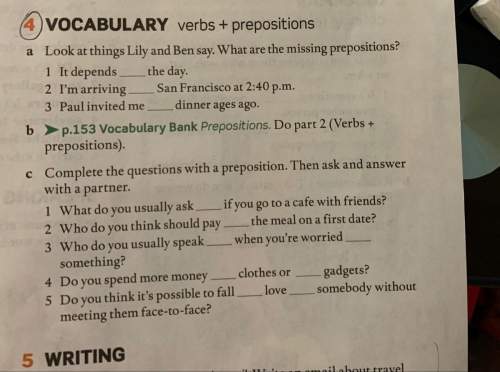
Read the passage, then answer the question.
The king of Evermore had every possession his heart could desire. His enormous castle was coated in shimmering gold, and his clothes were sewn with sparkling jewels. His countless horses were a brilliant white, and his magnificently scented flowers bloomed all year. Yet the king was dissatisfied.
“Surely there’s more to obtain,” he stubbornly complained, commanding his men to travel vast distances in search of additional jewels, horses, flowers, and gold. “More!” he whined. “I want more!” Yet no matter what his men fetched for him, the king remained unfulfilled.
How does the author convey the pointless nature of greed in this story?
Question 3 options:
by describing the distances his men go to in following his commands
by emphasizing the harmful trait of stubbornness
by contrasting the king’s endless possessions with his unending dissatisfaction

Answers: 1


Another question on English

English, 21.06.2019 23:00
Can anyone plz with this question i accidentally posted on physics it's 99 points plus this 5 ponts and will mark as brainliest link :
Answers: 1

English, 22.06.2019 01:00
Based on how the stage directions are used in this excerpt from act 1 scene 1 of richard iii what was likely the main purpose of providing stage directions in drama
Answers: 3

English, 22.06.2019 07:00
Which sentence in this excerpt from leo tolstoy’s the death of ivan ilyich shows the human tendency to contemplate one’s past life? "but if that is so," he said to himself, "and i am leaving this life with the consciousness that i have lost all that was given me and it is impossible to rectify it—what then? " he lay on his back and began to pass his life in review in quite a new way. in the morning when he saw first his footman, then his wife, then his daughter, and then the doctor, their every word and movement confirmed to him the awful truth that had been revealed to him during the night. in them he saw himself—all that for which he had lived—and saw clearly that it was not real at all, but a terrible and huge deception which had hidden both life and death. this consciousness intensified his physical suffering tenfold. he groaned and tossed about, and pulled at his clothing which choked and stifled him. and he hated them on that account. he was given a large dose of opium and became unconscious, but at noon his sufferings began again. he drove everybody away and tossed from side to side. his wife came to him and said: "jean, my dear, do this for me. it can't do any harm and often . healthy people often do it." he opened his eyes wide. "what? take communion? why? it's unnecessary! " she began to cry. "yes, do, my dear. i'll send for our priest. he is such a nice man." "all right. very well," he muttered. when the priest came and heard his confession, ivan ilyich was softened and seemed to feel a relief from his doubts and consequently from his sufferings, and for a moment there came a ray of hope. he again began to think of the vermiform appendix and the possibility of correcting it. he received the sacrament with tears in his eyes.
Answers: 2

English, 22.06.2019 07:00
Wiesel's speech begins after auschwitz the human condition is not the same nothing will be the same identify where similar language is repeated later in his speech what is the effect of this repetition
Answers: 2
You know the right answer?
Read the passage, then answer the question.
The king of Evermore had every possession his heart co...
Questions

English, 05.10.2019 22:10


Arts, 05.10.2019 22:10


English, 05.10.2019 22:10

English, 05.10.2019 22:10

Physics, 05.10.2019 22:10





Mathematics, 05.10.2019 22:10


Social Studies, 05.10.2019 22:10

Chemistry, 05.10.2019 22:10

Health, 05.10.2019 22:10


Geography, 05.10.2019 22:10


Business, 05.10.2019 22:10




